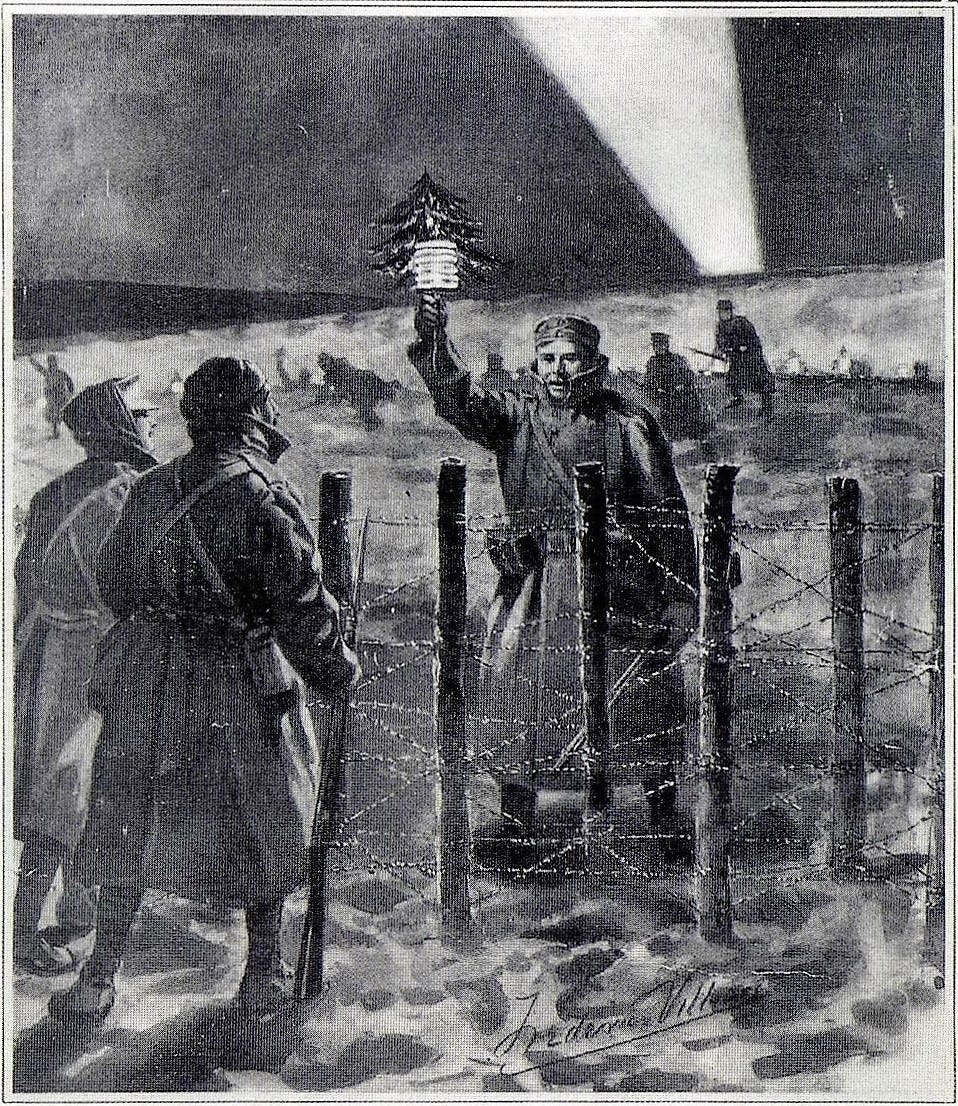
In 1914, a little less than five months after World War I began, fighting along the Western Front quieted.
For one day, the sounds of artillery shells were replaced by songs proclaiming Christ’s birth. On December 25, 1914, troops left their trenches to exchange gifts and niceties with the men on the other side—and to bury their dead without fear of interference.
Testimonies from the frontlines report soldiers trading tobacco, lighting fireworks, hanging banners, and playing improvised games of soccer on the battle-scarred no-man’s land that separated the Allies from the Central powers.
The peace wouldn’t last. By December 26, fighting began again in earnest, and unit commanders from both sides of the line warned their soldiers of the punishment they’d face for fraternizing with the enemy during the three wartime Christmases that followed.
We don’t know who the first soldier to step out of his trench and approach the enemy was, but I like to imagine the moment anyway.
Was he scared? Did he deliberate over his decision, or was it a spur-of-the-moment risk that happened to pay off? Did he look across the trench and realize that the young men on the other side might not be too different from the ones he sat shoulder-to-shoulder with every day?
The next morning, when rounds began flying through the air again, did he remember the face, the handshake, the carol-singing voice of his enemy?
Did he lament in the irony? Did he live long enough to?
I think that the Christmas Day truce of 1914 has held our imaginations captive for 110 years because it is so bizarre. World War I was a global watershed moment; a rude, unyielding reminder that humanity has not, in fact, transcended violence and war, despite the cultural thought leaders who were claiming (or maybe just hoping) otherwise.
The Industrial Revolution and its promises of progress made life better in a lot of ways; World War I showed us that it also helped us get really, really good at destroying each other.
Maybe the stories are fascinating because of the young soldiers’ naiveté; the idea that they, like the rest of the world, simply didn’t know how ugly things were about to become. Yet, when the story is retold, it’s typically without that hint of irony, that cynical sense of foreboding that’s so common in the modern cultural imagination.
Perhaps this modern myth epitomizes a desire much deeper than cynicism and sarcasm, much more integral to humanity than the need for progress and domination; perhaps it appeals to a deep-seated need for “peace that surpasses all understanding.”
Peace is guaranteed by Christ
As Jesus speaks to his disciples in John 14, just hours before he will be arrested and taken to be crucified, he assures them that the violent events they’re about to witness—and, ultimately, the circumstances they’ll find themselves in after his ascension—are not as hopeless as they might seem.
“These things I have spoken to you while I am still with you. But the Helper, the Holy Spirit, whom the Father will send in my name, he will teach you all things and bring to your remembrance all that I have said to you. Peace I leave with you; my peace I give to you. Not as the world gives do I give to you. Let not your hearts be troubled, neither let them be afraid.”
John 14:25-27
The image of German and British soldiers exchanging gifts from the trenches of World War I is powerful because of the radical peace it portrays. It’s also powerful because we know how short-lived that peace was.
Jesus’ peace isn’t like that. He says as much: “I don’t give as the world gives.” It’s much deeper, much more effective, much more permanent. There’s no waiting for the other shoe to drop; no anxiety about him revoking his promise; no need to fear the whistle of artillery shells flying again.
Peace is deeper than surface level
Because of that guarantee, the peace that Christians possess doesn’t evaporate when outside circumstances challenge it. This deep current of assurance reminds me of one of my favorite hymns:
“When peace like a river attendeth my way;
When sorrows like sea billows roll;
Whatever my lot, thou hast taught me to say,
‘It is well, it is well with my soul’”
It is only because of Christ that Horatio Spafford, the hymn’s original author, could have “this blessed assurance.” Spafford lost significant business interests in the Great Chicago Fire of 1871 and then, tragically, lost four daughters in a shipwreck in 1873.
During these otherwise insurmountable hardships, the hope of Christ was Spafford’s lifeline. It is only because of the deep, abiding peace guaranteed by Jesus that he could pen the words to this song. A Presbyterian layman, Spafford’s life exemplifies the first section of the Heidelberg Catechism:
“What is your only comfort in life and in death?
That I am not my own, but belong—body and soul, in life and in death—to my faithful Savior, Jesus Christ.
He has fully paid for all my sins with his precious blood,
and has set me free from the tyranny of the devil.
He also watches over me in such a way
that not a hair can fall from my head without the will of my Father in heaven;
in fact, all things must work together for my salvation.Because I belong to him, Christ, by his Holy Spirit, assures me of eternal life
and makes me wholeheartedly willing and ready from now on to live for him.”
Peace is our vocation
A few weeks ago, I shared a bit about the role of the believer in being not a peacekeeper, but a peacemaker, influenced by Jesus’ words in the Sermon on the Mount:
“Blessed are the peacemakers, for they shall be called sons of God.” Matthew 5:9
“There’s a subtle but significant difference between the two. A peacekeeper will do what it takes to make a situation blow over. They’re interested in quick fixes so everyone feels comfortable—even if it doesn’t solve anything in the long run.
That’s not the M.O. of a peacemaker. Peacemakers are ready and willing to do the dirty work of resolution and reconciliation. It’s awkward. It’s messy. It might make you unpopular. It requires a hefty dose of humility for all involved. And it’s absolutely vital work for the kingdom to flourish.”
From The love of Christ controls us, originally published 10/31/2024
The best news is that we don’t have to find it within ourselves to produce and promote peace. Ultimate, real, lasting, powerful peace is and only ever can be found through participation in the life of Christ. That True Peace becomes the springboard that empowers us to make peace wherever we go.
As we discussed last week, the idea of “peace on earth” removed from the reality of Christ’s life is contentious at best and depressing at worst. Praise God that we have seen and known him who is Peace—that he invites us, today, to share in that peace and to invite others into it as well.
The battle may continue long after Christmas Day, but the war has already been won.
From the archives:
One of my very favorite posts from this time last year.
What is Christmas about?
One of the sillier disagreements Carson and I have had was over a Christmas tree.







I love the story of the Christmas truce!